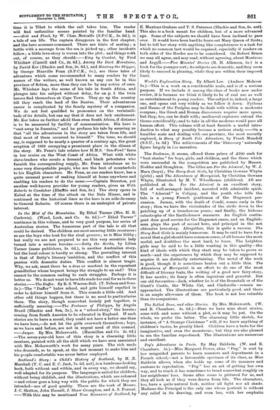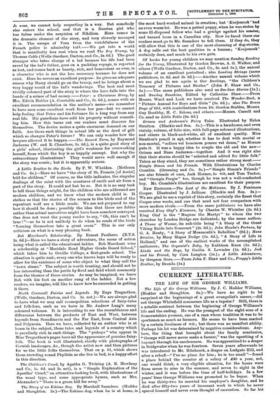Peg's Adventures in Paris. By May Baldwin. (W. and K.
Chambers. 5s.)—Miss Margaret Power, alias "Peg," is sent by her misguided parents to learn manners and deportment in a French school,—not a favourable specimen of its class, as Miss Baldwin allows, when she holds up some of its manners and customs to reprobation. " Peg " has an art of getting her own way, and to reach it has sometimes to tread somewhat roughly on her neighbours' toes. Scene after scene is pictured for us, and they all look as if they were drawn from life. The characters, too, have a quite natural look, neither all light nor all shade. Madame the Principal is the only one whose portrait is without any relief in its drawing, and even her, with her emphatic Je tens, we cannot help respecting in a way. But somebodY else enters the school, and that i6 a Russian girl who
has fallen under the suspieion of Nihilism. Here comes in the dramatic element of the story, and very Cleverly inanaged it is. The escape of Vera from the watchfulness of the French police is admirably told.-We get into a world
that is manifestly less real when we read The Boy Tramp, by Thomas Cobb (Wells Gardner, Darton, and Co., 28.6d.) The good stranger who takes charge of a lad because his life had been saved by the lad's father, goes on a yachting voyage, is reported he lost, and comes back as hearty, rich, and benevolent as ever, is a character who is not the less necessary because he does not exist. Here he serves an excellent purpose : he gives an adequate reason why Harry should go on the tramp, and he brings about a very happy result of the lad's wanderings. The best and most vividly coloured part of the story is where the hero falls into the hands of a &Diner of bad money.-Peter : a Christmas Story, by Mrs. Edwin Holder (A. Constable and Co., 3s. 6d.), comes with an excellent recommendation in the author's name-we remember to have seen some excellent work from her pen-but we cannot help feeling that Peter and his fortunes lie a long way from any real life. His guardians have sold his property without consult- ing him. How this turns out our readers must discover for themselves. The device makes a quite enormous demand on our faith. Are there such things in actual life as the deed of gift which so changes Peter's future? We can only wonder how the lawyers allowed it to happen.-The Record Term, by Raymond Sachems (W. and R. Chambers, 3s. 6d.), is a quite good story of a girls' school, illustrating the girl's weakness for overworking herself, from which the boy is so happily exempt. But why the extraordinary illustrations ? They would serve well enough if the story was comic ; but it is apparently serious.































































 Previous page
Previous page